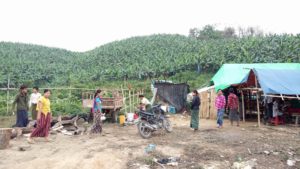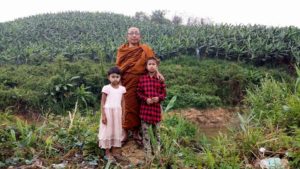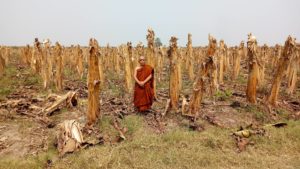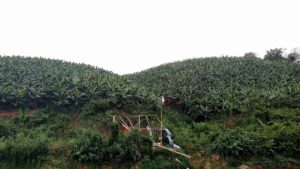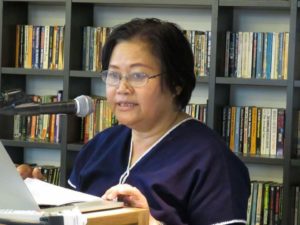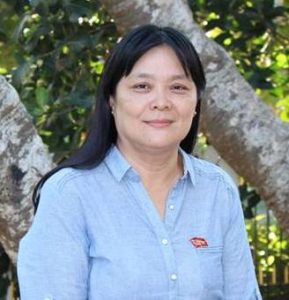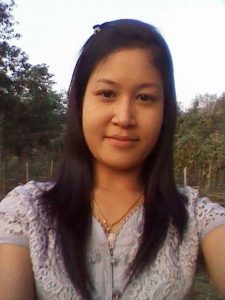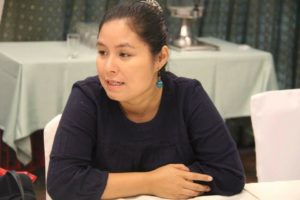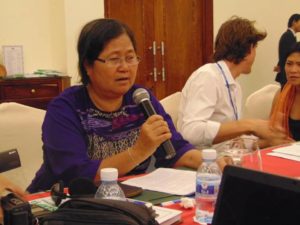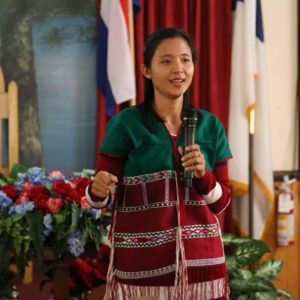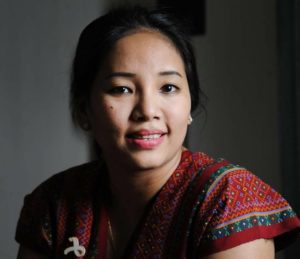Human trafficking in Chinese Banana Farms
“Some came back. Some did not come back”
A group of female workers in the Chinese’s banana plantations are facing human trafficking”, said Daw Lay Htet Aye, 36.
Daw Lay Htet Aye who live in Mut Kyate village, Wine Maw township, Kachin state said that young ethnic females, who went to work at the Chinese banana plantations were sold by the Chinese people into marriages in China. Within four or five years, more than 20 women were trafficked to China to become wives.
Local people said that around 5 years ago, Chinese man who were working in Chinese banana plantations in the Wine Maw township married ethnic Burmese women and brought them back to China to be sold.
Thousands of Chinese banana farms are located in the Wine Maw township, all the way along Ta Law Gyi road, all the way along from Wine Maw township to Lai Zar, Gwae Htu road and Shwe Naung Pin, etc.
Even though local people are against it, on March 17th, Myo Sat Kyal Pwint company bought lands for grazing in Mut Kyate village, Nant Wah village tract, Wine Maw township. The later cleaned the land with bulldozers to establish Chinese run banana plantations. Local people and women have been protesting against this.
The using of land and farms of the villagers which are located one or two miles away from Mut Kyate village were confiscated by the company and made a part of the banana plantation. Whilst the company increased their banana farm, the lives of local people and animals were put in danger and especially, women are made to feel unsafe. So they have to protest, said Daw Lay Htet Aye.
“We women, most of us are against it because if more workers came here, more women from our village will get into trouble. We get into trouble because we have seen what is happening around us. The workers from other areas such as Rakhine, Burmese and other outsider enter our village and cause trouble to us as women. If the company plants more banana trees they also dig more canals which are not safe for our children. Recently, the children next to our village fell into the canal and some of them died. Most importantly, women are not secure. Especially for our young daughters, it’s very dangerous.” Said, Daw Lay Htet Aye.
Many ethnic people throughout Burma including from the Rakhine state, Irrawaddy region, Myaungmya, Pathein, Moe Nyin, Ho Pin came to work in these banana farms.
The presiding monk, Ashin Wee Zar Ya Ka from War Shaung village in Wine Maw township said thathundreds of women and children are working in these farms and they face problems such as children unable to study, not enough space to bury the dead body, no proper toilet and many people living in battered huts built around the banana trees where the pesticides are sprayed. He had witnessed these workers’ situation.
“The smell of the chemical pesticides and fertilizers was extremely bad. The soils are also despoiled and hard. After the company has planted once, they do not plant again on the same place. They rent another land for planting. When we went there, the smell of the fertilizers were horrible”, said the presiding monk.
The presiding monk said that the Chinese banana plantation has planted almost all over the whole Wine Maw township for 8 years already. Over 40 women including young girls and married women from other areas within Wine Maw township such as War Shaung, Nant Wah, Lwel Kyaw and Wai Bar villages have been trafficked to China.
“Here, young girls who passed Grade 10 were working with them as interpreters and some worked as cooks. Chinese old men seduced them with money and brought the girls back to their country, including Shan girls. Even though those Chinese cannot speak any Burmese many girls follow them to China. Some people though that Chinese who come here to sell water melons are rich and that is why they follow them.”
Moreover, because of the Chinese banana plantations, around 10 consequences according to strategy occurred among political, economic, military affairs, social, legalization, human trafficking, drug problem and affairs of maternal and children. Those are also the sign of the failure of Burmese future, as commented the Presiding monk.
“Human extinction. People end their lives in a banana farm. When they grow up they are sold to China. Lands were confiscated. Human were exploited. The main problem is having sycophant among the ethnic. Even among the ethnic people they take advantage of each other” said the presiding Monk.
Moreover, Daw Hseng Naung who is a 60 years old widow from Mut Kyate village said that around the banana farm, they dig the canals which were 5 feet wide, 8 feet deep as fences, and last two years a child age of 4 has drowned in the canal and died. That is their biggest concern.
She said, “In the village, if Chinese came and start a banana plantation, our future will be full of danger. They use various pesticides and fertilizers which could make our lives unsafe. They also dig a deep canal around the banana farm which is twice the height of the people and it is so dangerous for the children. We cannot let our cow and buffalo go anywhere. Cow, buffalo drowned in those canals and died as well.
Daw Hseng Naung continue said that they destroyed and cut off our trees in an acre land that we have been working on for many years, especially iron wood trees, Cassia trees and Ya-Ma-Nay trees which we have grown for more than 10 years. Cutting them down we would face a life of joblessness. Therefore they have to act against these plantations to keep ownership of their lands.
She said that they depend on Cassia trees for their income and living. They cut the Cassia trees once in three years to get food, pay children’s school fees and use money for family living.
The land is around 2 acres that Daw Lay Htet Aye’s family owns and depends on for their living and children’s education. It was taken away by Myo Set Kyal Pwint company. As a result they lost their place to stay and became unemployment, that’s why they have to fight against the banana plantations.
Because the Chinese have planted banana trees everywhere, there is nowhere local people could find frogs, fishes and vegetable to eat. Finally they just have to work in the banana to earn living.
People from Myitkyina and Wine Maw township came and bought the firewood there in their place and they sold out two or three cars of firewood so it covers their children school fee and their living expenses. A car of firewood could get more than 100,000 Kyat.
Daw Lay Htet Aye said that in March 13, the trees in the garden, such as teak, iron tree, Cassia trees which make money for the family were removed by bulldozer which made them very upset.
“They removed everything in our garden land. Only a bamboo grove left because we prevented for it unduly. The company act like it is mandatory to sell our land to them. We need these two acres of firewood land for our children school fee. Not every house can use electricity. They said that we can work on daily wages but we cannot go every day. We have children to take care of, so if we have this firewood land then we could cover for food by working on farm. Now, we are so upset that we do not have the firewood land.” Said, Daw Lay Htet Aye.
People who work in banana farm get different wages, women get (4500) Kyat and Men get (5000) kyat per a day.
In the past years, the company said that they bought the land of the local people just to look after the cows and goats and the local people could find the firewood as much as they can. But now, they paid the compensation around eight hundred thousand to twelve hundred thousand per an acre of land to do the banana plantation. This is what the locals are against said Daw Lay Htet Aye.
The fertilizers and pesticides used for the banana farm are very strong and they wash the used materials in the stream near there. Cows and buffalo died by drinking that water, said local resident of Mut Kyate village, Sayar John Phoung Daung Zae.
The owner of the Myo Set Kyal Pwint company is known as Director Saung Lann Yainn Chan but he worked for the Chinese, said local people.
In July 8 2018, Nant Wah local people sent the objection letter to Kachin’s State Prime Minister through U Naw Li; the representative of state Hlut Taw from the Wine Maw township, but they did not take any action and the company is still digging the local peoples’ land by bulldozer that’s why Nant Wah local people continue to fight.
“We submitted the objections letter to the Prime Minister, and the general administration department and Department of land records checked to company once on 11 February, but there was no responsible person so they asked to follow up with the office. A week later, we got the forest and land records. There was no notice that we even submitted the objections letter to the State Prime Minister. That is why we the local people have to stand for ourselves and against the banana farms.”
There are also banana plantations at the place which is a little further from the Mut Kyate village. There the use of chemical fertilizer caused several consequences, such as fish dying in the river, and buffalo and cows dying after drinking the water in the river.
It has been 8 years already that Chinese bananas farms were grown in Shwe Nyaung Pin, Sann Phar, Man Winn and Gway Htu from Wine Maw township. Now, Myo Set Kyal Pwint company is digging more than (350) acres of land for additional banana plantation in Mut Kyate village, Nant Wah village tract, Wine Maw township. Recently, they have finished digging 200 acres of land and are ready to plant the banana trees there. Because of that the local people have to protest said Sayar John John Phoung Daung Zae.
Nang Kham Ying from Shan women network affirmed that women from the area near the banana farms were facing human trafficking to China.
She said, “Using pesticides and fertilizers could cause the abortion of pregnant women. It could be side effect to pregnant women. It is really dangerous work. They did not consider for the long-term. Because of lack of job opportunity, most people have to work for Chinese which makes me unhappy.”
Since 2010, Chinese banana plantations have been working on those aforesaid areas and it’s been about 7 to 8 years already. In 2017, the banana plantations were also grown in the Shwe-Nyaung-Pin military bases area. After 8 years of banana plantation, it effects social, economic, environmental and women were threatening by trafficking which all proves what presiding monk War Shaung has said.
“There are different ways of human trafficking. There is the common way of human trafficking, which is happening in other areas and another way is persuading with money slowly. In here, our Kachin women and Shan women were paid twenty thousand or twenty-five thousands of Chinese money. The main thing is that they use the women just for giving birth to babies. They try to marry women from here and later on resell them to other men. Kachin and Shan were effected under that structure. They also persuaded the Shan leaders with money to take away their women as well. They cheated the local people and brought them back to China.”
